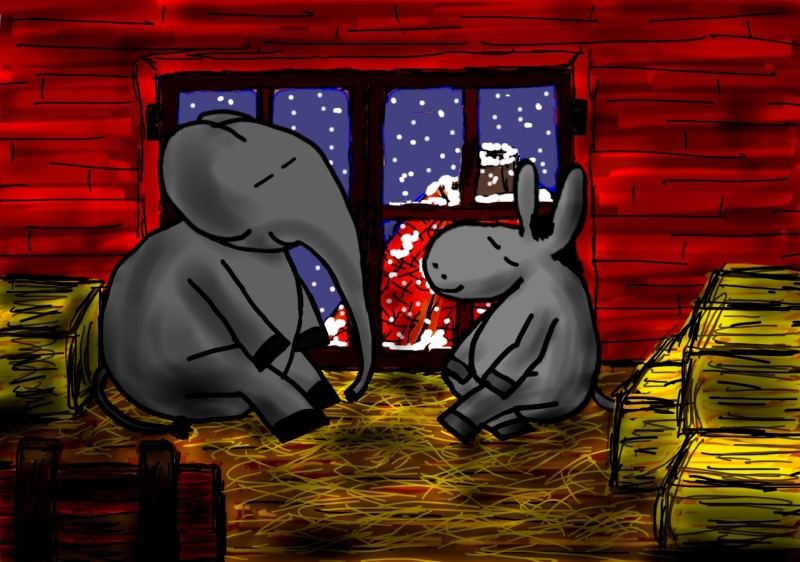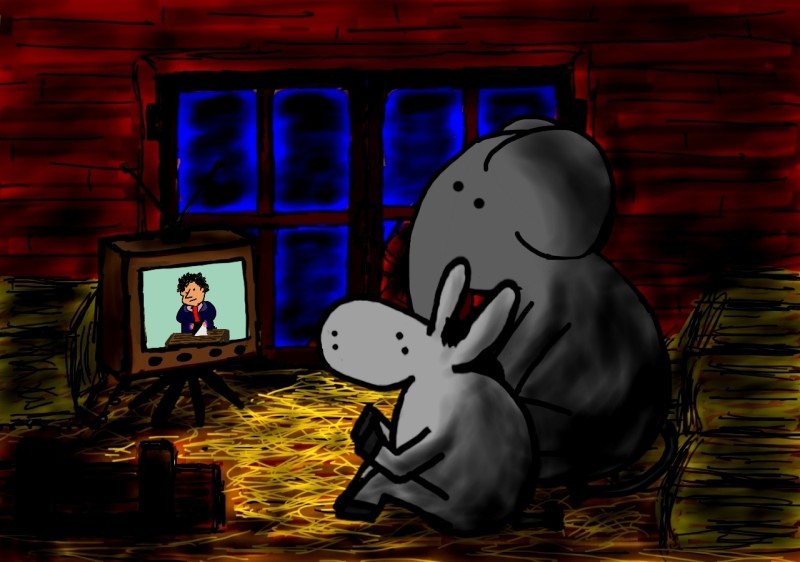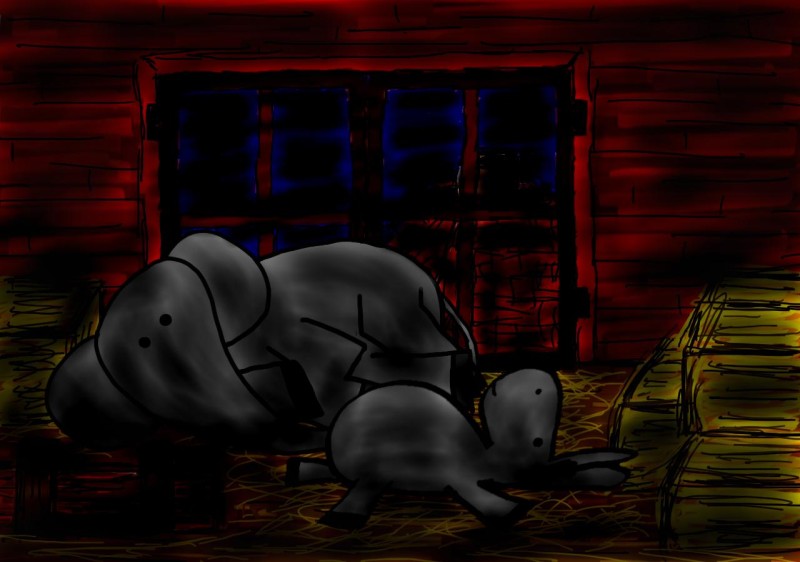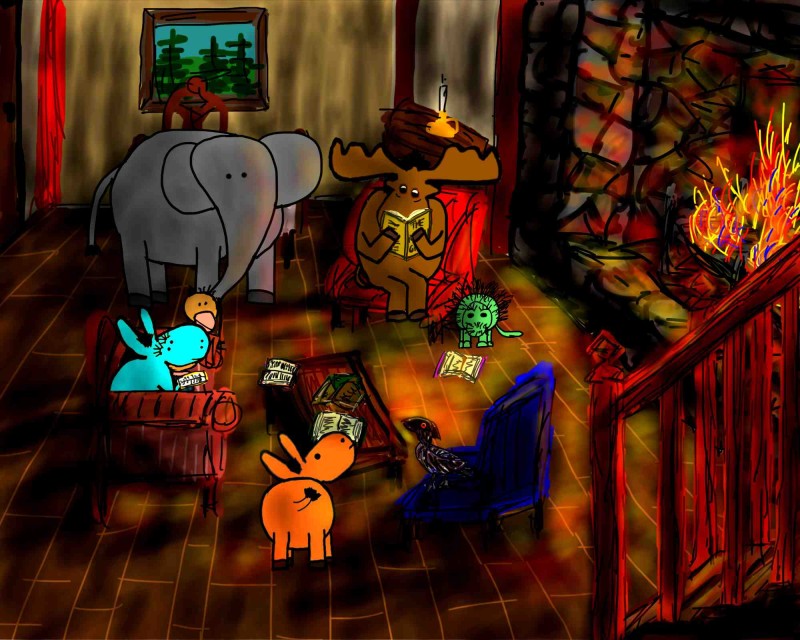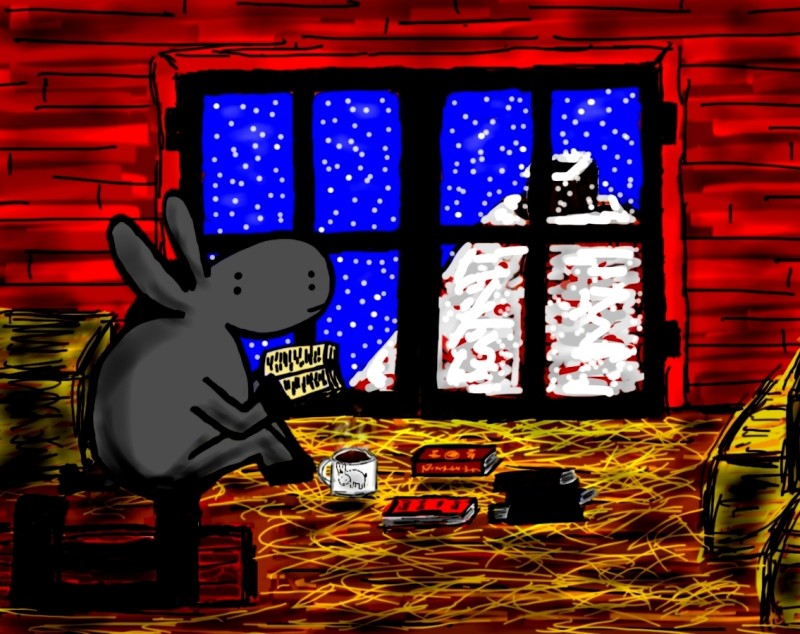You have not spoken of pumpkin pie.
I have not spoken of pumpkin pie.
This is the true pumpkin pie.
Tag: harlan
“Blurtso can’t get serious”
Stay tuned for the News Hour and tonight’s roundtable debate, “Can black and white be considered colors, and if so, which one is more colorful?” moderated by Dr. Jonathan Wellborn Truington III, renowned taxidermist and Pulitzer prize-winning author of, Is White White or Is White the New Black?
I think humans, said Blurtso, take themselves too seriously.
“Blurtso hears a whisper” (IX)
Harlan? said Blurtso. Yes? said Harlan. Do you miss Borneo? Yes, said Harlan. What do you miss most? I miss it all, said Harlan, the beauty, the peace, the danger, the poverty. You miss the poverty? said Blurtso. Yes, said Harlan. Wouldn’t it be nicer, said Blurtso, without the poverty? Not, said Harlan, if it just becomes a playground for the rich. Oh, said Blurtso. What do you think about international aid? I think it’s often misguided, said Harlan, and there’s nothing worse than convincing someone they need something that they didn’t need before.
“Weohryant University” (XXVII) – Who 101
Today’s question, said Harlan, is “Who ate the last piece of pie?”
I didn’t do it, said Emma Lou.
Neither did I, said Frank.
Why is the last piece, said Morton, more important than the first?
Or any of the other pieces? said Emma Lou.
That’s a good question, said Frank.
It’s not polite, said Chelsea, to eat the first piece, and it’s greedy to eat the last.
If you didn’t get one of the earlier pieces, said Morton, it’s not greedy to eat the last.
That’s true, said Chelsea.
Who determines what is polite, said Frank, and what is not?
Baldassare Castiglione, said Glouster, wrote a book in the sixteenth century called, Il cortegiano.
Il what? said Morton.
Il cortegiano, said Glouster, is a book that describes how an educated person should behave in Renaissance Italy.
A book that defines courtesy? said Chelsea.
“Courtesy,” said Glouster, is “behavior marked by polished manners or respect for others.”
Respect for others? said Frank. That takes us back to “love thy neighbors” and the Upanishads.
Everything that’s worthwhile, said Emma Lou, takes us back to “love thy neighbors.”
Does Il cortegiano say who gets the last piece of pie? said Morton.
No, said Glouster, but it gives an outline of courteous behavior.
There’s not much of that around, said Chelsea.
Courteous behavior? said Glouster.
Yes, said Chelsea, just this morning I was crossing the street—in the crosswalk—and a truck honked me off the road.
I know what you mean, said Morton, I always say hello to people at the bus stop, but they look at me like I’m crazy.
Maybe they’ve never seen a talking donkey, said Frank.
That’s possible, said Morton.
What is Catiglione’s definition of courteous behavior? said Emma Lou.
Castiglione, said Glouster, says that a courtesan should be familiar with classical literature, skillful in athletic competition, adept in writing poetry, able to play musical instruments, accomplished in painting, conversant on philosophical themes, and knowledgeable and graceful in dance; and should be able to do these things with “sprezzatura.”
Gesundheit! said Chelsea.
Thank you, said Glouster, that was very polite, but I didn’t sneeze. “Sprezzatura” is the art of making difficult things look easy.
How do you do that? said Morton.
Practice, said Glouster.
Oh, said Morton.
Can we practice being courteous? said Chelsea.
Yes, said Emma Lou, let’s!
Well, said Glouster, we’re already reading classical literature, so we don’t have to do that, but we’ll have to start practicing sports, poetry, music, painting, and dance.
I love to dance! said Chelsea.
O.k., said Glouster, you can teach dance.
I can whistle and chirp, said Frank.
O.k., said Glouster, you can teach music.
I have a rhyming dictionary, said Emma Lou.
O.k., said Glouster, you can teach poetry.
I can draw circles with my hoof in the sand, said Morton.
O.k., said Glouster, you can teach painting.
How about moose? said Chelsea.
Moose can teach sports, said Glouster.
What will you teach? said Frank.
I’ll teach philosophy, said Glouster.
I can hardly wait to be a courtesan! said Emma Lou.
Me too! said Chelsea.
So what’s the answer, said Frank, to the original question.
The original question? said Chelsea.
Yes, said Frank, “Who ate the last piece of pie?”
The answer, said Morton, is that it’s time to bake a new pie.
“Blurtso hears a whisper” (VIII)
Harlan? said Blurtso. Yes? said Harlan. Do you hear that? said Blurtso. No, said Harlan. Are you sure? said Blurtso. Yes, said Harlan. How about that? said Blurtso. No, said Harlan. Really? said Blurtso. Yes, said Harlan. Hmm, said Blurtso, I thought I heard something. You probably did, said Harlan, you have very good ears. Yes, said Blurtso, too good. Too good? said Harlan. Yes, said Blurtso, some things are better left unheard.
“Blurtso looks at the snow” (XIII)
“Blurtso hears a whisper” (VII)
Harlan? said Blurtso. Yes? said Harlan. Are you awake? Yes, said Harlan. What are you thinking about? said Blurtso. Differences, said Harlan. Differences? said Blurtso. Yes, said Harlan, political, religious, and personal differences… like what one person thinks is fun and another does not, and what one thinks is proper and another does not, and what one thinks is necessary and another does not. Yes, said Blurtso, it’s amazing we ever get along. I suppose, said Harlan, that’s what love is for.
“Blurtso hears a whisper” (V)
Harlan? said Blurtso. Yes? said Harlan. Are you awake? Yes, said Harlan. What are you thinking of? Einstein’s theory of time, said Harlan. What? said Blurtso. You know, said Harlan, the discovery that time passes more slowly the faster you move. Is that true? said Blurtso. Yes, said Harlan. So I would live longer, said Blurtso, if I moved more quickly? Yes, said Harlan. And if I ran in my sleep, said Blurtso, I would get more sleep?
“Blurtso hears a whisper” (IV)
Harlan? said Blurtso. Yes? said Harlan. Why are elephants afraid of mice? We’re not afraid, said Harlan, we just don’t like to step on them. Oh, said Blurtso, that’s understandable. There’s nothing that breaks an elephant’s heart, said Harlan, like stepping on a mouse. Elephants are very sensitive, said Blurtso. Yes, said Harlan.
“Weohryant University” (XXV) – Who 101
Welcome to “Who 101,” said Harlan. Today’s question is “Who’s responsible?”
Responsible for what? said Morton.
I didn’t do it, said Emma Lou.
Neither did I, said Frank.
“Responsible,” said Glouster, means “being the cause or explanation; able to answer for one’s conduct and obligations; able to choose between right and wrong;” and, “marked by accountability.”
It’s not always easy to choose between right and wrong, said Chelsea.
Why not? said Frank.
Because what’s wrong for me, said Chelsea, may be right for someone else.
Like what? said Morton.
Like the color green, said Chelsea.
The color green? said Frank.
Yes, said Chelsea, the color green looks terrible on me, but it might look lovely on someone else.
Sometimes it’s also difficult, said Emma Lou, to answer for your conduct.
What conduct? said Frank.
Instinctive conduct, said Emma Lou. How can you answer for actions that are performed without thinking?
That’s true, said Morton, when I see a pumpkin pie, I can’t be held responsible for my conduct.
Or a shiny worm, said Frank.
Or a minnow, said Glouster.
Is there anything for which we can be held responsible? said Chelsea.
We can be held responsible for how we treat our friends, said Frank.
What about our enemies? said Chelsea.
Jesus, said Glouster, said we should love our enemies.
He didn’t mean cats, said Frank.
What if our enemies want to hurt us? said Chelsea.
An “enemy,” said Glouster, is “someone who is antagonistic to another, often seeking to injure, overthrow, or confound an opponent.”
You can love your enemy, said Emma Lou, without loving what they do.
Maybe you can convince them, said Chelsea, to act differently.
Yes, said Glouster, to act responsibly.
Even if that responsibility goes against their instincts? said Morton.
Maybe, said Emma Lou, responsibility can inspire us to alter our instincts so we can get along with others.
That, said Glouster, is called “social responsibility.”
“Social responsibility?” said Morton.
Yes, said Glouster, the responsibility that enables societies to exist, that enables individuals with different desires to live in harmony.
I like social responsibility, said Morton.
So do I, said Chelsea.
I don’t think cats are capable, said Frank, of social responsibility.
